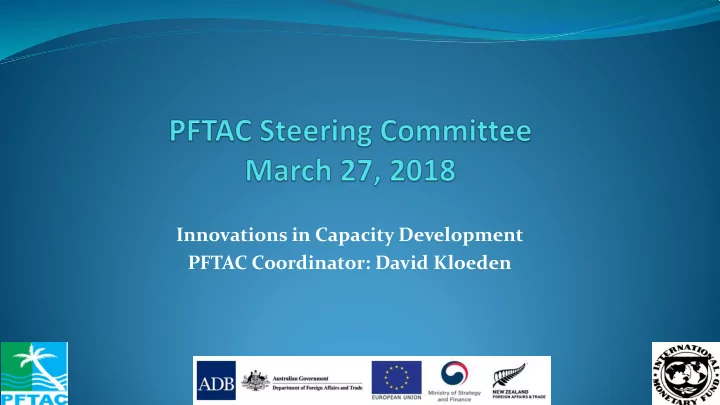

Innovations in Capacity Development PFTAC Coordinator: David Kloeden
A GENDA Traditional Approaches to Capacity Development CD INNOVATIONS Training Developments Peer-to-Peer Initiatives Enhancing the Pool of Regional Experts The Next Generation – Internships/Young Professionals
T RADITIONAL CD A PPROACHES Training: Workshops and seminars delivered in-country, sub-regionally, or regionally Encouraging and facilitating in-person IMF training in Washington at Institute of Capacity Building or Singapore Training Institute Technical Assistance: Headquarters-led Diagnostic Missions PFTAC in-country missions by LTX and/or STX Remote TA to country from PFTAC by LTX or by STX from home Hybrid arrangements, e.g. joint mission to several Northern PICs
T RAINING D EVELOPMENTS Integrating Training and TA into Capacity Development: Catalogue of updated courses in core areas of IMF expertise Increasing use of customized training, adapting courses to reflect country-specific data and case studies for greater relevancy: PFTAC planned approach with STI in FY2019 Reinforces/enhances TA with training tailored to reform and capacity building priorities Massive Open Online Courses (MOOCs): Free of charge, open to all government* officials of any agency Periodically scheduled, complete at own pace during designated period Available courses, with more coming: Debt Sustainability Analysis (DSAx); Macroeconomic Diagnostics (MDSx); Macroeconometric Forecasting (MFx); Financial Programming and Policies Parts 1 & 2 (FPP.1x & FPP.2x)
O N -L INE T RAINING More IMF eLearning Courses being developed or planned A suite of Statistics courses are proposed under the D4D initiative (more later) Online Assessor Training for TADAT – Tax Admin Diagnostic Assessment Tool Fiscal courses coming, including in Revenue Administration and Tax Policy, under Revenue Mobilization Trust Fund On-Line Public Financial Management course – PFMx Pilot run late 2017; next public offering May 9 – July 4 Excellent 15-module package for current/potential PFM practitioners and policy makers PFTAC exploring ways to maximize and leverage the course, use segments to supplement in-person training, pre-requisite for advance training, partnering with universities….
O N -L INE PFM X C OURSE
P EER - TO -P EER I NITIATIVES Many PFTAC workshops are collaborative affairs: Between programs and agencies: e.g. statisticians and forecasters or revenue officials With development partners to leverage their comparative advantages, ADB, WB, UN Innovative joint Pacific-Caribbean tax event planned in July PFTAC workshops always a two-way flow of information & experience sharing: facilitators provide training and sharing international best-practice; and participants share their experiences with peers and facilitators Workshop discussions often lead to requests for PFTAC TA Attachments provide a more individualized peer-to-peer sharing opportunity: PFTAC organizes/funds a visit of a small delegation from one country to another Short report prepared after visit of lessons learned and potential application
B UILDING THE R EGIONAL E XPERT P IPELINE Capacity Development (CD) aims to build both Institutional and Individual Capacity IMF CD is delivered by experts: HQ; LTX; STX Attachments between Only a few PFM & Revenue experts from the region; Institutions much more needs to be done to identify, nurture, Enhanced Regional Human Capacity for and build broad experience to join Expert Roster Effective ‘ Enhanced’ Regional Financial/Economic Some ‘ Enhanced Attachments’ will be trialled, e.g. Attachments Recruitment Management & to build of RTAC PEFA mission – opportunity to learn and contribute Policy Making individual Resident Experts capacity* Workshop/seminar facilitation a good pathway RTAC/ IMF Testing Goal: more Pacific experts delivering CD to Pacific, Short-Term Regional Usage of Experts for both STX and on the PFTAC team as LTX Regional IMF Experts Roster*
… AND SUPPORTING THE NEXT GENERATION Plan to emulate highly successful Caribbean PFTAC team internship program of 100 interns placed over includes a few Young past decade in Central Banks, fiscal agencies, and Professionals Attachments at CARTAC. 90%+ still working in region Internship s between Institutions Plan to start with modest pilot program with two Enhanced Regional short placements at PFTAC in July. Human Capacity for Effective ‘ Enhanced’ Regional Discussed with USP for pilot, will widen at year- Financial/Economic Attachments Recruitment Management & to build of RTAC end with other source and placement options Policy Making individual Resident capacity* Experts Past external evaluation proposed ‘Young Professional’ program. Want to pilot later in 2018 RTAC/ IMF Testing Short-Term Regional Usage of like an LTX apprentice over 12 – 18 month term Experts for Regional IMF Roster* Experts
Thankyou .
Recommend
More recommend